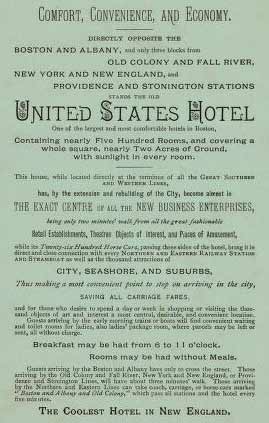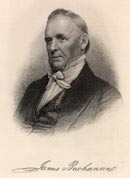|
This might be entitled: The 331⁄3
%
Solution One third of our triumvirate (ckr)
sent to one third of our triumvirate (me) the
following information about the Boston Chess Club from
Daniel Willard Fiske's Book of the 1st American Chess
Congress.
In October of that year [1845], several
gentleman interested in chess, to bring the amateurs of the city together.
Having obtained about 20 names a preliminary meeting was held Monday October 27
at the United States Hotel. Much interest was manifested in the project and Dr.
Le Baron Russell
1.,
Max Isnard and George Hammond were appointed a committee to draft a Constitution
for the Club.
They "rented and furnished a room" for the
club at 1 Montgomery Place (now Bosworth Street), a short, 1 block street in
south side Boston, east of the Burial Grounds above the Boston Commons that ran
from Tremont St. to Province St., sandwiched between and parallel to
School St. and Bromfield St.
Most of the structures there were private residences and boarding houses.
The new club proved fairly popular and in a short time reached forty members,
notably:
Messrs. Adams, Isnard, Hammond, Bullard,
Russell, J. W. Clark, George P. Hayward,
B Austin, S. Willard, C. Stodder, I. J. Austin, Dr. B. D. Greene, A.D.
Parker, A. W. Fuller,
J. Schouler, S. Wells, E. Tyler, P. P. F. Degrand, B. Rolker, C. L.
Bartlett, C. Thatcher,
Dr. H. Richardson
2, C. G.
Kendall, Mr. Dexter, Dr. J. W. Stone,
E. J. Weller and B. A. Smith
However, after it's initial popularity, it stagnated and the membership
started to dwindle until in 1848, the club was disbanded. Some of the most
active members continued to meet and play on a less official basis at the United
States Hotel
3 until the advent of the 1st Chess Congress and the
arrival of Paul Morphy on the American chess scene rekindled the interest in
chess.
A few of the members of the old club were in the habit of playing
together at the United States Hotel, and the other amateurs of the game would
sometimes be fortunate enough to meet a rival in private circles. There was not
any effort made, however, to bring the Chess-players together again although the
true chess spirit still lived, and new men were entering the arena.
With the opening of the year 1857, the first number of the Chess Monthly was
issued. The publication of this serial brought about results more marvelous than
those produced by the Whistle Shrill of Roderick Dhu. Amateurs of chess started
up on all sides and pressed forward to enter the ranks of the Caïssa army. Early
in the year the National Chess Congress was projected. The announcement of this
meeting of the leading players to contend for the championship, was the bugle
call that aroused the knights of Caïssa and bade them arm for the contest. Then
came the bustle of preparation. There was a brushing up of openings and endings,
an overhauling of the standard chess works and much practicing at divers
positions. Boston was not idle, and some half dozen of her players were present
at the congress, where the performances of Messrs. Hammond and Richardson, the
latter fresh from contests with Harrwitz at the Café de la Régence, won for them
a deservedly high position amongst the foremost players of the country, and
established a reputation for Bostonian Chess.
Meanwhile lovers of Chess wondered why there were not any regular meetings for
the practice of the game, and appeals to the players urging them to unite and
organize a club, were made through the columns of the Evening Transcript in
connection with notices of the new magazine and items of chess news. In
September, by invitation of Mr. E. J. Weller, several gentlemen assembled for
play at No. 8 Hayward place. These meetings continued through October, and on
return of Messers. Hammond, Richardson and others from the Congress in New York,
the circle was enlarged and in November numbered 12. The gentlemen who then met
were Messrs. Hammond, Richardson, Rabuske
4, Broughton, S. Willard, Smalley,
Chapman , Weller, Everett, Keyes and G. H. and C. P. Howard.
*
* Of the above named gentleman
Messrs. Everett, Rabuske, Weller and the two Howards, had been in the habit of
playing together and with other amateurs, during the early part of the year, at
the United States Hotel.
Horace Richardson proposed the meetings should be made public. A notice was
published in the daily newspapers and on December 11, 1857 about 30 gentlemen
were present.
Many members from the 1846 club came forward again and joined and the Boston
Chess Club was once again an entity. In 1858 the club roster was:
President: Dr. Horace
Richardson
Secretary: George W. Smalley
Treasurer: Edwin J. Weller
Executive Committee members:
George Hammond
William R Boughton
Dr. James W. Stone
Theodore Rabuske
The Boston Chess Club seemed to prosper and upon
Morphy's triumphant return from Europe, the members feted him at
the Revere House Hotel . Among the 140 invited guests
were: Dr. Horace Richardson (president of the Boston Chess club), Jared Sparks,
President Walker of Harvard College, Prof. Pierce of Harvard, Speaker of the
House Charles Hale, Rev. Dr. Huntington, Prof. Lowell, Chief Justice Shaw, Joel
Parker, Prof. Agassiz, Prof. Longfellow, Rev. T. Starr King, Henry Wilson, Mayor
Lincoln, Joshua Quincey, Jr., Edwin P. Wipple, James Fields, and B. F. Thomas.
18 speeches were given and James Russell Lowell wrote and delivered a 100 line
poem for the occasion.
Oliver Wendell Holmes opened the ceremonies introducing Paul Morphy with:
"I propose the health of Paul Morphy, the world's Chess
Champion" After Morphy retired from
chess and the Civil War dampened the American spirit, the Boston Chess Club
seemed to have languished but still remained somewhat intact.
A December, 2002 article by Paul Hoffman for
Harvard Magazine states that:
The Harvard Chess Club, founded in 1874, is one
of the oldest chess clubs in the country. It was started by the generation of
undergraduates inspired by the New Orleans prodigy Paul Morphy, the nation's
first great player...[here was inserted some misinformation about Morphy]...
Harvard played its first correspondence game in February 1879, against the
Boston Chess Club. The surviving score sheet is incomplete, so that it is not
clear who won. Nine months later, Harvard played a second postal game, against a
Mr. Everett of the Exeter Chess Club. The game lasted only 10 moves because "Mr.
Everett here resigned on account of the death of his sister." Both games were
notable because they featured a sequence of opening moves, called the King's
Gambit, that is rarely played today except by a few romantics. The King's Gambit
is a swashbuckling opening, favored by Paul Morphy, in which White tries to
checkmate Black early in the game, without first sheltering his own king.
So in 1879 the Boston Chess Club still existed.
Whether Mr. Everett of the Exeter Club is the same Mr. Everett from the Boston
Chess Club (and who played in the consultation game
against Morphy) is unclear.
1.
LeBaron
Russell, M.D. (1814–1889), nephew of the Apothecary General, received his
medical degree from Harvard in 1842. A passionate abolitionist and
philanthropist, Russell supported the New England Emigrant Aid Company which
helped to ensure that Kansas became a free state (in 1861). During the Civil
War, Russell served as Special Commissioner for the War Department, examining
the living conditions of African American refugees at Fortress Monroe in
Virginia.
2.
A Horace Richardson graduated from Harvard Medical school in 1852
3.

4.
A Theodore Rabuske illustrated the book, Utah and the
Mormons: The History, Government, Doctrines, Customs, and
 Prospects of the
Latter-Day Saints by Benjamin G. Ferris (Harper, New York) in 1854. He was
listed as an artist at 96 Washington Street, Boston, Mass. 1858-1860. In the
1855 Schodack, NY census, a Theodore Rabuske was listed as a 40 year old,
married, German born engineer. In the Archival Collections at the Missouri
Historical Society, among the papers of John H. Droste, were "two notebooks
containing German script (poetry) of Theodore Rabuske ( -1897), an artist who
moved to St. Louis in 1867." Prospects of the
Latter-Day Saints by Benjamin G. Ferris (Harper, New York) in 1854. He was
listed as an artist at 96 Washington Street, Boston, Mass. 1858-1860. In the
1855 Schodack, NY census, a Theodore Rabuske was listed as a 40 year old,
married, German born engineer. In the Archival Collections at the Missouri
Historical Society, among the papers of John H. Droste, were "two notebooks
containing German script (poetry) of Theodore Rabuske ( -1897), an artist who
moved to St. Louis in 1867."
Hon. James Buchanan, democratic candidate for the presidency,
1856 /
lith. & pub. by Theodore Rabuske
Index |
Archives by Title
links
personal
Sarah's Serendipitous Chess Page
The Life and Chess of Paul Morphy
Sarah's Chess History Forum
chess - general
Chesslinks Worldwide
chess - history
Mark Week's History on the Web
Chess Journalists of America
Chess History Newsgroup
Hebrew Chess
Chess Tourn. & Match History
Super Tournaments of the Past
La grande storia degli scacchi
Bobby Fischer
Bill Wall's Chess Pages
|

